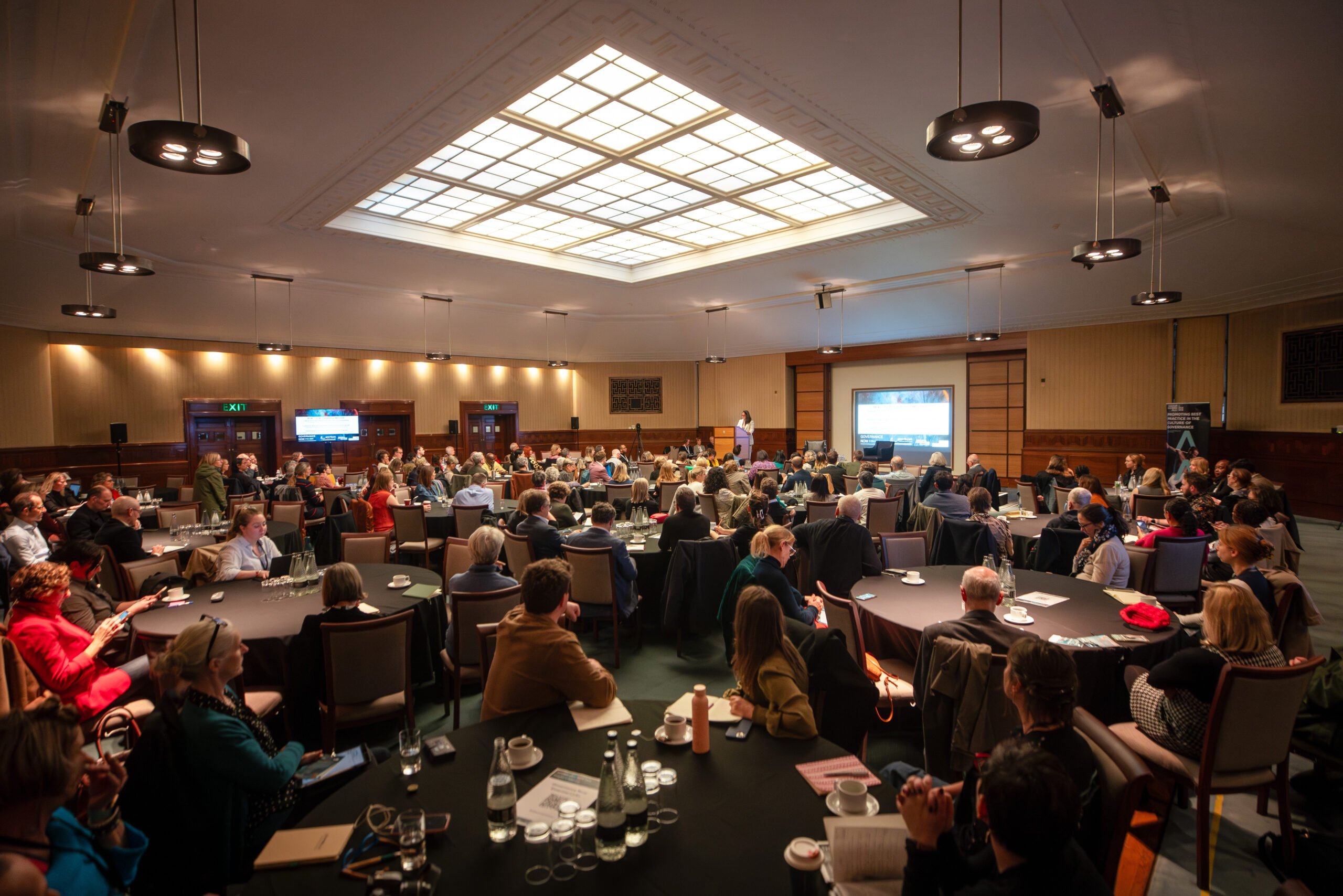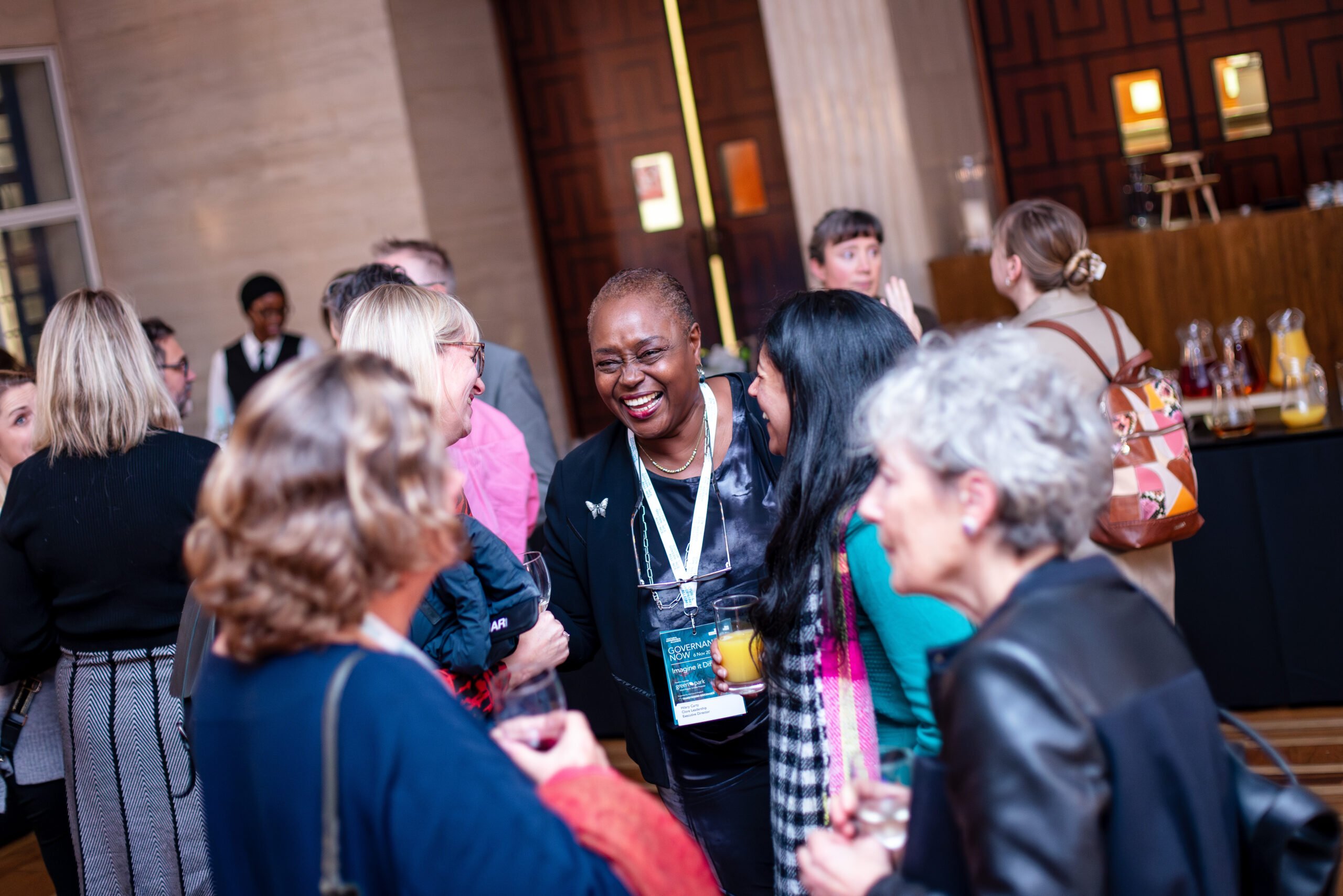
More than 250 leaders from across the cultural sector gathered to grapple with tough governance issues at Governance Now: Imagine it Different, Senate House, 2024
Photo: Harry Elletson
How can boards navigate perilous times?
Earlier this month trustees from arts organisations gathered for the flagship annual governance event Governance Now: Imagine it Different*. Conference producer Rowena Price reflects on their collective aim to find bold, imaginative ways to weather current storms.
“I have no time to daydream – I am too busy balancing the budget or fixing the roof.”
Sound familiar? In her opening address to the conference, Arts Council England’s Tonya Nelson acknowledged a reality that most, if not all, of the 250 culture sector leaders in the room will have been grappling with. The tyranny of budgets in the red, black and actual holes in leaking roofs – in short, business as usual in the current climate.
Encouraging, then, to see so many people show up to collectively engage in the essential work of horizon scanning, and to consider how to make their organisations fit for the future – “to lead change, rather than react to it”, as Nelson urged.
We are all acutely aware that the sector’s resilience and adaptability is being tested like never before – that the need for more robust, more diverse and more effective governance is top of the agenda. But how can boards truly ‘imagine it differently’? Break free of the governance paradigms of old? And, crucially, take meaningful action to embrace more imaginative responses to ever-growing challenges?
At the conference, we explored the interventions for change needed from cultural organisations and their boards at a time when business as usual simply isn’t enough to see our sector survive and thrive.
Sessions on best practice in inclusive governance, the role of artificial intelligence (AI) in our work, new decision-making models, the role of local government and more offered rich insights and ideas to take forward.
Knowledge sharing is power
“The largest AI model in production has three million neurons. All of you have 86 billion neurons. Each of you is thirty times more powerful than the most powerful AI today.” Dr Doug Gurr
In his opening keynote speech – AI: Friend or Foe? – Dr Doug Gurr, director of the National History Museum, put it to delegates that feeling powerless in the face of rapid technological change is more of a state of mind than a reflection of reality. Cue: curiosity piqued alongside a palpable degree of bristling in the room.
Alongside examples of how AI can improve access, enhance working lives and generate revenue, there were understandable concerns around the environmental impacts and intellectual property implications of AI which surely demand further scrutiny. And if the arts sector wants influence in this area, cultural leaders and creatives across the board must be proactive in sharing knowledge and experience.
In a session examining the most pressing governance issues, Cath Hume from the Arts Marketing Association (AMA) delved into details, sharing practical solutions. “We are not experts on this subject,” said Hume, “but we know there’s a gap in this area, and that we can help to pool and share knowledge.”
Which is exactly what they’re doing. By crowdsourcing AI intel and experiences, the AMA is curating an ever-evolving draft AI policy for the sector – a great place to start if you’re on a cultural board that needs to define its position, develop AI policy and upskill its team.
Persistence pays off
Where one organisation props a door open, the power of the collective can prise it open further until it comes clean off its hinges. Matt Peacock’s practical example of how Arts & Homelessness International successfully petitioned the Charity Commission to allow them to pay trustees turned into a rallying cry for others to do the same.
The issue of trustee remuneration is arguably one of the most tangible and stubborn barriers to boards becoming more equitable and representative of the people they serve. Dedicating time and offering skills for free is a privilege. How might the effectiveness and make-up of our boards evolve if we could pay people to serve on them?
Likewise, in the spirit of Tonya Nelson’s opening pledge to support boards to lead change, Shonagh Reid and Michelle Wright’s session on New approaches to inclusion encouraged boards to persist in prioritising a fundamental reframe of inclusion work at the highest level. If you’re not seeing the change you want to see fast enough, what might you unlock if you adopt an anticipatory approach, rather than a reactionary one?
Continues…

Governance Now 2024 at Senate House, London. Photo: Harry Elletson
Courage calls to courage
Another key theme of the day was bravery. Whether you are trailblazing a new approach, operating outside of the status quo, or having to face the difficult, sometimes heartbreaking decision of if or when to close, nurturing the ability to make and follow through on bold decisions is an essential part of governance. And we should be inspired by the courage of our peers.
Hedda Archbold, former chair of Kneehigh Theatre which closed in 2021, stressed the importance of communication and seeking support in her session on Closing an organisation well. “It was a painful process that caused discord… We realised that winding up felt like bereavement. Everyone involved went through all the stages of grief.”
A timely reminder that no single person stewarding an arts organisation – whatever that may look like – is alone in bearing these burdens. Hedda’s advice? Keep seeking your allies and advisors, ask for help, and consider – once you’ve made a decision to do something difficult – what would it look like to do it well?
Good governance – radical governance – requires community
Perhaps the most enlivening part of the day was a series of roundtable discussions proposed and led by the delegates: sparky conversations on topics including safeguarding of artistic and organisational freedom of expression, inclusion and succession planning, finding new forms of revenue, and even ‘rewilding’ governance to bring about change.
The energy and ideas in the room served to highlight not only a shared appetite for change, but a hunger for collaboration in tackling the knottiest of challenges. There is both solace and inspiration found in community and governance work – especially chairing – can be lonely. If we are to succeed collectively in rewriting the governance playbook, it is essential we don’t go it alone.
Some may argue that the day-to-day business of survival leaves little room for imagination or, dare I say it, hope. I would argue the opposite. The speakers and delegates at our conference proved that imagination and hope are alive and well – and that the alchemy of them both en masse can and does create positive change.
As James Baldwin once said: “I can’t afford despair. I can’t tell my nephew, my niece… You can’t tell the children there’s no hope.” A sentiment to fuel imagination and action, if ever there was one.
*Governance Now is the flagship annual conference on cultural governance, presented by Clore Leadership in partnership with the Cultural Governance Alliance . Governance Now 2024 was made possible thanks to Headline Supporter Green Park, with additional support from Arts Council England’s Transforming Governance Programme and Media Partner Arts Professional.
For discounted tickets for next year’s Governance Now, and to be the first to know about future governance events by Clore Leadership and the Cultural Governance Alliance, join the CGA free at culturalgovernancealliance.org/join-us.
Join the Discussion
You must be logged in to post a comment.